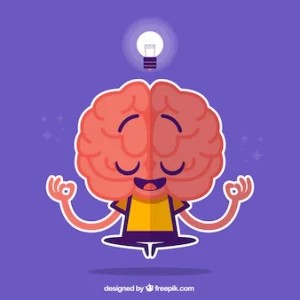The ability to adapt to the changes in oneself and the environment is known as emotional agility. You may level up and develop emotional agility, thanks to EQ. Gaining EQ improves your ability to relate to others, fosters empathy, and improves your ability to respond to others thoughtfully.
What are the Benefits of a Strong EQ?
A person with a high EQ can advance more quickly in their careers and perform better in leadership positions. Being aware of your feelings and communicating them are two aspects of emotional intelligence.
- Understanding others’ feelings is the first step in developing emotional intelligence since it enables us to approach interpersonal interactions with empathy.
- The architecture of emotion involves several functions played by different regions in the brain. Impulse control, empathy, emotion, and decision-making are all governed by the front part of the brain, while irrational thoughts are produced in the amygdala.
- The presence of adrenaline, which can cause the freeze, fight, or flight response, might impact this thinking. When more than one person is involved, the amygdala reacts before the reasoning half of your brain can catch up, and the repercussions can be disastrous.
- An emotional response from another person might cause the individual in question to have a similar or reactive response. This phenomenon is known as emotional contagion. To maintain control and prevent “amygdala hijacking,” we may practice developing our emotional intelligence.
In the end, isn’t emotional intelligence what cultivates relationships with people and influences them to do the desired action? And to accomplish that, follow these five evolutionary stages!
Evaluating the Intensity and Duration of Feelings
There are many degrees of intensity for every sensation and its characteristic mental, psychological, and bodily states. From mild agitation or mental disturbance to serious pathological responses that need outside direction and particular care.
There is an emotional foundation to all basic emotions, although moods are more subdued and persistent than emotions. Temperament, the capacity to generate a certain feeling or mood, goes beyond emotions.
For a clearer picture of our emotional life and to spot any potential emotional disturbances, it is crucial to understand our feelings’ emotional strength and length.

1. Question your Opinions.
Spend some time considering the viewpoints of others so you can weigh your opinions. Having different views makes it easier to comprehend other individuals’ thought processes. Understanding this will make you more open to fresh ideas. In our highly linked society, getting caught in an “opinion bubble” is easy, so having a more robust standing on your opinions and beliefs is essential.
2. Remember to Unwind!
Life presents us with a variety of challenges, and the majority of us routinely feel stressed out. Remind yourself to breathe. Call a timeout and do anything to keep your cool. You can wash your face with cold water, get some fresh air, or prepare a rejuvenation drink. Do whatever it takes to give yourself a moment to collect your thoughts.
3. Understand What Keeps you Going!
Often, people begin a project but fail to finish it because they lose motivation. The challenge is remembering your drive when hardship arises. Take the time to figure out what inspires you and use it to propel you to the finish line of any project.
How do you Keep your Emotions in Check?
One important technique is to alter your sensory input – as the adage goes, motion dictates emotion. So shake up your physical body by attending an exercise class or channeling your active mind with a puzzle or a book. According to Productivityist Paul Minors, making a vow to yourself that you’ll get things done makes it tougher to procrastinate.
Empathy is the Most Effective Tool in Mastering Emotional Intelligence!
Empathy is the ability to understand the feelings of others. To be empathetic, you enable their experiences to echo with your own so that you may respond emotionally appropriately. It’s a lifetime skill that’s crucial for handling relationships. Empathy may not come quickly, but there are methods to cultivate it.
Here are some tips for cultivating empathy in your behavior.
- Before empathizing with someone, you must first grasp what they’re saying, implying that listening is at the heart of empathy.
- Sometimes, there is no right or wrong answer, but you will comprehend enough to reach a decision or provide helpful advice.
- The simplest method to acquire some perspective is to put yourself in the other person’s shoes and consider what is going on from their point of view.
- Whether you’re the team leader or working on a project with others, try to stay friendly and available.
Final Thoughts
You can realize your full potential and achieve your goals by understanding and effectively utilizing emotional intelligence. Remember, being too critical ruins morale faster than anything else. People are only human and have the same motives (and limits) as you. Take the time to comprehend another person before communicating the desired change.
If you want to explore your emotional intelligence quotient and know more about your personality, Dr. Grimes is here to help you!
